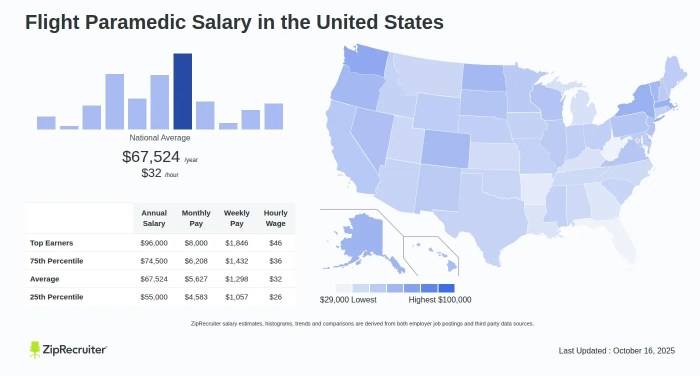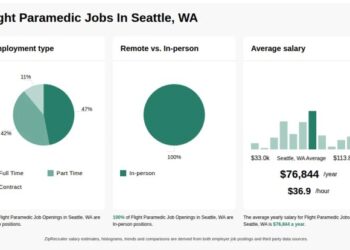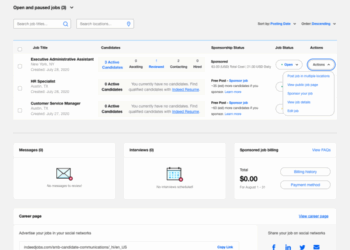Flight Paramedic Salary: How Much Can You Earn in 2025? sets the stage for this enthralling narrative, offering readers a glimpse into a story that is rich in detail with casual formal language style and brimming with originality from the outset.
Exploring the role of a flight paramedic, the factors influencing salary, and the importance of specialized training and certifications paint a comprehensive picture of the earning potential in this field.
Overview of Flight Paramedic Salary
Flight paramedics play a crucial role in providing emergency medical care to patients in critical situations, often in remote or hard-to-reach areas. These highly skilled professionals are trained to stabilize patients and provide advanced medical care during air transport to medical facilities.Factors that influence the salary of flight paramedics include level of experience, location of work, employer (hospital-based program or private company), and additional certifications or specialized training.
Flight paramedics with more experience or working in high-demand areas may command higher salaries.Specialized training and certifications such as Advanced Cardiac Life Support (ACLS), Pediatric Advanced Life Support (PALS), and Prehospital Trauma Life Support (PHTLS) can significantly impact a flight paramedic's salary potential.
Employers often value these additional qualifications and may offer higher compensation to those with advanced training.
Importance of Specialized Training and Certifications
Flight paramedics with specialized training and certifications have the knowledge and skills to handle complex medical emergencies effectively during air transport. These additional qualifications demonstrate a commitment to professional development and can set a flight paramedic apart in a competitive job market.
- Advanced Cardiac Life Support (ACLS) certification equips flight paramedics with the skills to manage cardiac emergencies and ensure the best possible outcomes for patients.
- Pediatric Advanced Life Support (PALS) certification focuses on the unique needs of pediatric patients, preparing flight paramedics to provide specialized care to children in critical conditions.
- Prehospital Trauma Life Support (PHTLS) training enhances a flight paramedic's ability to assess and manage traumatic injuries, improving patient survival rates in high-stress environments.
Current Average Salary Trends

Flight paramedics play a vital role in providing emergency medical care during air transport. Let's delve into the current average salary trends for these dedicated professionals.
Average Salary Range
As of 2021, the average salary for flight paramedics in the United States ranged from $40,000 to $90,000 per year. However, this range can vary based on factors such as experience, location, and employer.
Salary Trends Over the Last Few Years
- In recent years, there has been a steady increase in the average salary for flight paramedics. This growth can be attributed to the increasing demand for air medical services and the specialized skills required for this role.
- With advancements in technology and medical practices, flight paramedics are expected to continue seeing salary growth in the coming years.
Regional Variations in Salaries
Salary variations for flight paramedics can also be influenced by geographical location. For example, flight paramedics working in metropolitan areas or regions with a higher cost of living may command higher salaries compared to those in rural areas.
Projected Salary Growth by 2025
In the ever-evolving field of healthcare, the salary trends for flight paramedics are expected to show significant growth by 2025. Several factors contribute to this projected increase, including changes in healthcare policies, advancements in technology, and the growing demand for emergency medical services.
Factors Influencing Projected Salary Increase
- The demand for emergency medical services is expected to rise, leading to an increased need for qualified flight paramedics. As the demand increases, so does the value of their skills and expertise, resulting in higher salaries.
- Advancements in medical technology are constantly improving the quality of care provided by flight paramedics. With access to cutting-edge equipment and techniques, paramedics are able to deliver superior care, warranting higher compensation.
- Changes in healthcare policies and regulations can impact the reimbursement rates for medical services, including those provided by flight paramedics. As policies evolve to reflect the value of emergency medical care, paramedics may see a boost in their salaries.
Expected Growth Rate in Salary
- Based on current trends and projections, the salary growth rate for flight paramedics is estimated to be around 10-15% by 2025. This increase is reflective of the growing demand for their specialized services and the value placed on their life-saving skills.
- As the healthcare industry continues to recognize the critical role of flight paramedics in providing timely and efficient emergency care, salaries are expected to rise steadily over the coming years.
Impact of Healthcare Policies and Technology
- Changes in healthcare policies, such as increased funding for emergency medical services or improved reimbursement rates, can directly impact the salary projections for flight paramedics. Positive policy changes can lead to higher salaries as the value of their services is recognized and rewarded.
- Advancements in medical technology, including new equipment, telemedicine capabilities, and data management systems, can enhance the efficiency and effectiveness of flight paramedics. This technological progress can translate into higher salaries as paramedics adapt to and master these new tools and techniques.
Highest Paying Regions or Employers
When it comes to flight paramedic salaries, the earning potential can vary depending on the region or the type of employer. Some regions or employers offer higher salaries compared to others, making it important to consider these factors when pursuing a career in this field.
Private Companies vs. Hospitals vs. Government Agencies
In general, private companies tend to offer higher salaries for flight paramedics compared to hospitals or government agencies. Private companies often have more resources and are willing to pay a premium for experienced and skilled flight paramedics. On the other hand, hospitals and government agencies may offer more stability and benefits but typically have lower salary scales for flight paramedics.
Benefits and Challenges of Working in High-Paying Regions
Working in high-paying regions as a flight paramedic can have its advantages and challenges. The benefits include the potential for higher salaries, better access to resources and training, and the opportunity to work with cutting-edge technology. However, high-paying regions often come with a higher cost of living, increased competition for job opportunities, and potentially more demanding work environments.
It's essential to weigh these factors carefully before deciding to work in a high-paying region as a flight paramedic.
Specializations and Salary Variances
In the field of flight paramedicine, different specializations can impact salary levels significantly. Paramedics who choose to specialize in certain areas often have the potential to earn higher salaries due to their advanced skills and expertise.
Critical Care Paramedic
Critical Care Paramedics work in highly intense environments and are trained to handle complex medical situations. They often work in critical care transport teams, including helicopter and fixed-wing air ambulances. Due to the specialized training and skills required for this role, Critical Care Paramedics typically earn a higher salary compared to general flight paramedics.
Flight Nurse Paramedic
Flight Nurse Paramedics are registered nurses with additional training in flight paramedicine. They provide advanced medical care during transport and work closely with other healthcare professionals. The combination of nursing expertise and paramedic skills makes Flight Nurse Paramedics highly valuable in the field, leading to higher earning potential.
Specialized Certifications
Obtaining specialized certifications such as Neonatal Resuscitation Program (NRP), Advanced Cardiac Life Support (ACLS), or Pediatric Advanced Life Support (PALS) can also impact salary levels for flight paramedics. These certifications demonstrate advanced skills and knowledge in specific areas of medicine, making paramedics more competitive in the job market and eligible for higher-paying positions.
Critical Care Transport Specialist
Critical Care Transport Specialists are paramedics who specialize in transporting critically ill patients between medical facilities. They are trained to provide advanced medical interventions during transport and work closely with healthcare teams to ensure patient safety. Due to the specialized nature of their work, Critical Care Transport Specialists often command higher salaries in recognition of their expertise.
Ending Remarks
In conclusion, delving into the world of flight paramedic salaries reveals a dynamic landscape with promising growth prospects and rewarding opportunities. Whether you're considering this career path or are simply curious about the earnings forecast, the journey ahead is filled with exciting possibilities.
FAQ Section
What are the main factors that influence salary for flight paramedics?
Factors such as experience, location, employer, and specialized training play a significant role in determining the salary of flight paramedics.
Are there specific certifications that can boost a flight paramedic's salary?
Obtaining certifications like FP-C (Flight Paramedic-Certified) or CCP-C (Critical Care Paramedic-Certified) can enhance a flight paramedic's earning potential.
How do regional variations impact the salaries of flight paramedics?
Salaries for flight paramedics can vary based on the cost of living in different regions, with metropolitan areas often offering higher pay than rural areas.
What are some of the highest paying employers for flight paramedics?
Private air ambulance companies, major hospitals with dedicated air transport services, and government agencies like the military often provide competitive salaries for flight paramedics.
How can specializing in a certain area within flight paramedicine affect salary levels?
Specializing in areas like neonatal care transport or search and rescue missions can lead to higher earning potential for flight paramedics due to the specialized skills required.










